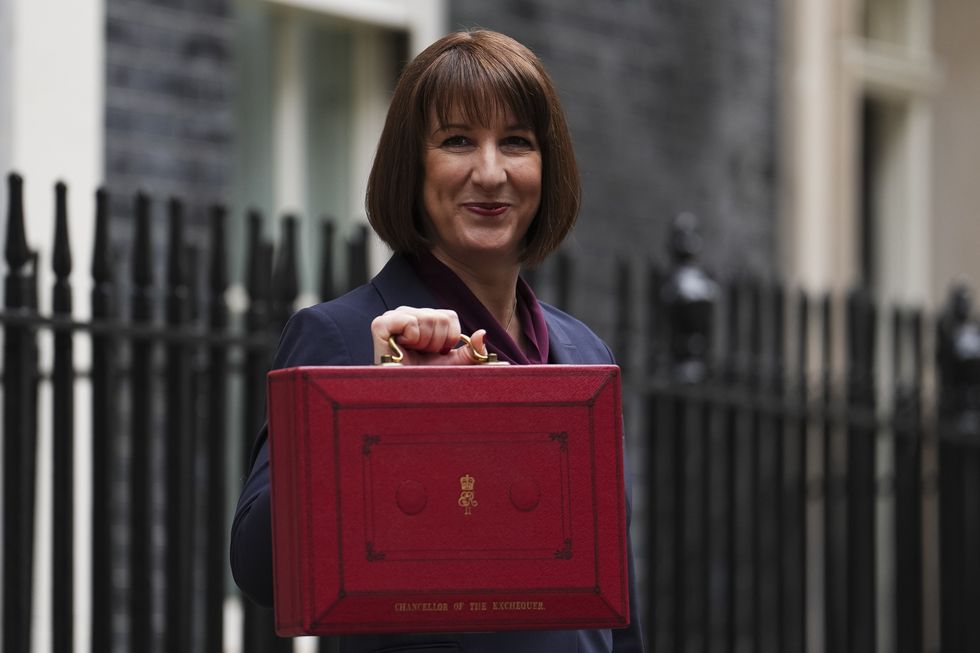Rachel Reeves announces an increase in Employers’ national insurance contributions to 15% …
GB News
Slashing Employers’ NIC threshold to £5,000 will hit part time workers, majority of which are women
Don't Miss
Most Read
Trending on GB News
Rachel Reeves may be the first female Chancellor in history, but her budget could ‘significantly disadvantage women in the workplace’, experts have warned.
The Labour Chancellor announced £40billion worth of tax rises last week, largely funded by a major reform to Employers’ National Insurance Contributions, a levy companies pay directly to the government.
Currently, companies pay 13.8 per cent tax on employees’ salaries over £9,100, meaning if you earned £50,000pa, your employer would pay an NIC of £5,644 to the government.
But Reeves has slashed that threshold to £5,000 and increased the rate to 15 per cent in a move expected to raise £23.7 billion for the government in 2025/26.
Commentators have been quick to highlight the negative effect this could have on businesses with the cost of employing staff rising.
But, as GB News can reveal for the first time, the move could also disproportionately affect women as they are more likely to work part time than men, with many thousands earning a salary between £5,000 and £9,100.
Steve Webb, former Liberal Democrat MP and Minister of State for Pensions, explained: “Until now, it has been ‘free’ for an employer to pay people in that income band in terms of employer NICs, but now there’s an increased cost.
“That may lead to fewer jobs being created in that sort of wage level and that is more likely to affect women than men.”

Rachel Reeves announced her historic budget on Wednesday raising taxes to £40billion
PAJon Greer, head of retirement policy at the wealth management firm Quilter, said: “NIC reforms could have significant implications for part-time workers, particularly women who fulfil more part time roles in the UK workforce.
“With the threshold lowered, employers will incur higher NIC costs for a larger portion of their workforce.
“Whilst it's early days, businesses might look to reduce their workforce, including part-time positions, or they may cap hours to reduce their wage bill.
“Similarly, the increased NIC costs could make employers more hesitant to hire part-time workers in the first place, making it more difficult for women to find part-time employment.
“It is something that could inadvertently lead to greater job insecurity for women and alter the composition of the workforce.
“It could also have broader implications for work-life balance and the ability of women to participate in the labour market while managing other responsibilities.”
Latest government statistics show 38 per cent of women in employment worked part-time, compared with 14 per cent of men. Six million women currently work part time in Britain.
Becky O'Connor, Director of Public Affairs at PensionBee, commented: "The increase in Employers’ NICs could force difficult choices.
“Since women are more likely to hold part-time positions, employers might view these roles as less financially viable and reduce them, which would make it harder for women seeking flexible, part-time work.
“If part-time opportunities dwindle, women—especially those balancing caregiving responsibilities—could find themselves excluded from the workforce, with long-term implications for the gender pay gap and the subsequent gender pension gap.
“Part-time roles are often a vital entry point for women, allowing them to manage work alongside other commitments.
“Reduced availability of these roles could mean fewer pathways to economic security.
“In the long run, this could limit workforce participation and reduce financial autonomy for women."
Furthermore, the NIC increase will add extra pressure on the education and social care sectors as they employ a large number of people on low salaries, most of which are women.
Responding to concerns the budget disproportionately affects women, a Treasury spokesperson said: “We are protecting the lowest paid with a boost to the National Living Wage to £12.21 an hour, and have protected working people’s payslips with no rise on VAT, income tax or national insurance."
Mims Davies, Conservative MP and Shadow Minister for Women and Equalities, said of the budget’s effect on women in general: “Women across the country will undoubtedly pay the price for Labour’s Budget of Broken Promises.
“Darren Jones had to admit that Labour’s rise in employer’s National Insurance will make working people poorer.
"The Joseph Rowntree Foundation estimates that the average family will be £770 worse off in real terms by October 2029 compared to today.
“Single parent families, of which over 80 per cent are headed by women, will be £1,000 worse off on average by October 2029.
"What’s more, the 5.2 million women who will lose their winter fuel payments under cuts planned by the Labour Government will take no comfort from this budget."
However, some organisations like the Women's Budget Group say it is too early to tell what the effect of lowering the NIC threshold will be.
A WBG spokesperson said: “We just don’t know what the behavioural impacts will be. Some sectors deliberately only employ staff part time in order to avoid Employers’ NICs and they may change their practice once the threshold is lower.
“However, there are many sectors that employ part time staff to meet fluctuating demand over the working day or week so part time jobs are unlikely to disappear.
“The change of threshold does mean a greater impact on lower paid workers, but the increase in the National Living Wage will prevent wages being squeezed too low.
“But those just above NLW rates may find that they get smaller pay increases as their employer’s pay bill increases.”







